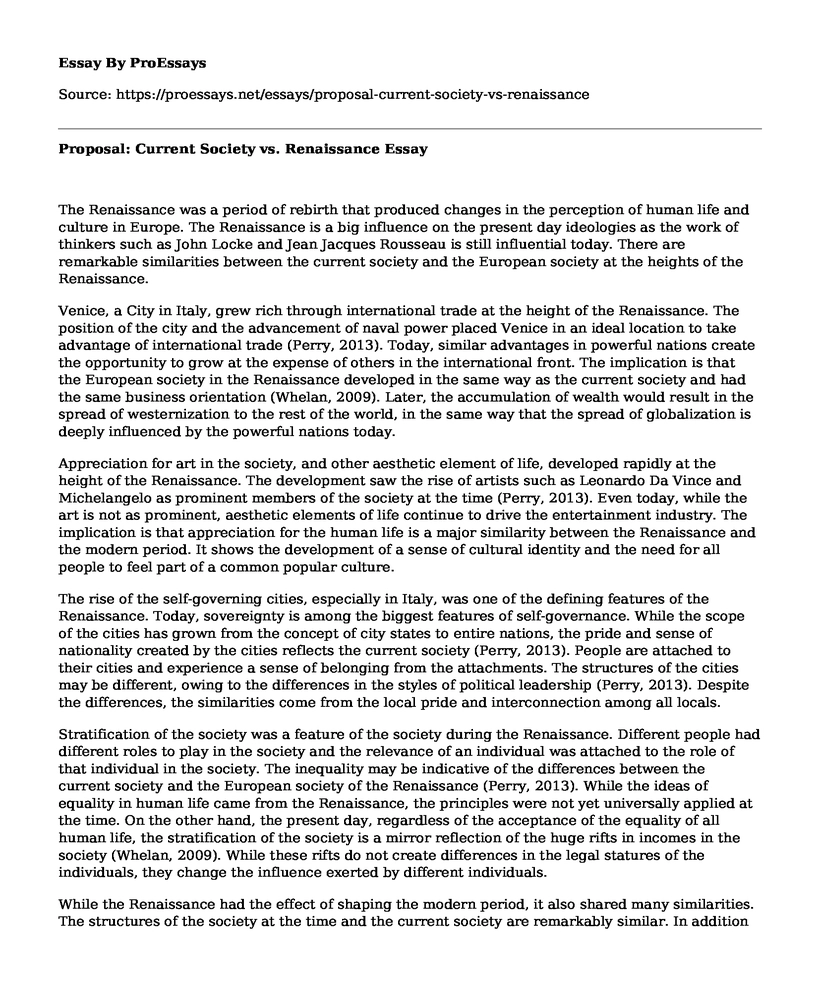The Renaissance was a period of rebirth that produced changes in the perception of human life and culture in Europe. The Renaissance is a big influence on the present day ideologies as the work of thinkers such as John Locke and Jean Jacques Rousseau is still influential today. There are remarkable similarities between the current society and the European society at the heights of the Renaissance.
Venice, a City in Italy, grew rich through international trade at the height of the Renaissance. The position of the city and the advancement of naval power placed Venice in an ideal location to take advantage of international trade (Perry, 2013). Today, similar advantages in powerful nations create the opportunity to grow at the expense of others in the international front. The implication is that the European society in the Renaissance developed in the same way as the current society and had the same business orientation (Whelan, 2009). Later, the accumulation of wealth would result in the spread of westernization to the rest of the world, in the same way that the spread of globalization is deeply influenced by the powerful nations today.
Appreciation for art in the society, and other aesthetic element of life, developed rapidly at the height of the Renaissance. The development saw the rise of artists such as Leonardo Da Vince and Michelangelo as prominent members of the society at the time (Perry, 2013). Even today, while the art is not as prominent, aesthetic elements of life continue to drive the entertainment industry. The implication is that appreciation for the human life is a major similarity between the Renaissance and the modern period. It shows the development of a sense of cultural identity and the need for all people to feel part of a common popular culture.
The rise of the self-governing cities, especially in Italy, was one of the defining features of the Renaissance. Today, sovereignty is among the biggest features of self-governance. While the scope of the cities has grown from the concept of city states to entire nations, the pride and sense of nationality created by the cities reflects the current society (Perry, 2013). People are attached to their cities and experience a sense of belonging from the attachments. The structures of the cities may be different, owing to the differences in the styles of political leadership (Perry, 2013). Despite the differences, the similarities come from the local pride and interconnection among all locals.
Stratification of the society was a feature of the society during the Renaissance. Different people had different roles to play in the society and the relevance of an individual was attached to the role of that individual in the society. The inequality may be indicative of the differences between the current society and the European society of the Renaissance (Perry, 2013). While the ideas of equality in human life came from the Renaissance, the principles were not yet universally applied at the time. On the other hand, the present day, regardless of the acceptance of the equality of all human life, the stratification of the society is a mirror reflection of the huge rifts in incomes in the society (Whelan, 2009). While these rifts do not create differences in the legal statures of the individuals, they change the influence exerted by different individuals.
While the Renaissance had the effect of shaping the modern period, it also shared many similarities. The structures of the society at the time and the current society are remarkably similar. In addition to the cultural values, the structures of governance and the sources of pride for the societies are similar because of the increased value of human life in the period.
References
Perry, M. (2013). Western civilization: Ideas, politics, and society. Boston, MA: Wadsworth, Cengage Learning.
Whelan, F. G. (2009). Enlightenment political thought and non-Western societies: Sultans and savages. New York: Routledge.
Cite this page
Proposal: Current Society vs. Renaissance. (2021, Mar 14). Retrieved from https://proessays.net/essays/proposal-current-society-vs-renaissance
If you are the original author of this essay and no longer wish to have it published on the ProEssays website, please click below to request its removal:
- Conflict in Marital Relationships
- History of Egyptian Civilization. Essay Sample
- Whether Blacks Have Higher Rates of Hypertension as Compared to White Races?
- Analysis of Bad Indians Using Bizzell's Concept of Hybrid Discourse as a Lens
- Life Without a Father - Narrative Essay
- Jenniffer Peters Leasing Consultant Is Diverse, Open and Team-Driven - Essay Example
- Division of Law: Greek Society's Slaves vs. Free People - Essay Sample







